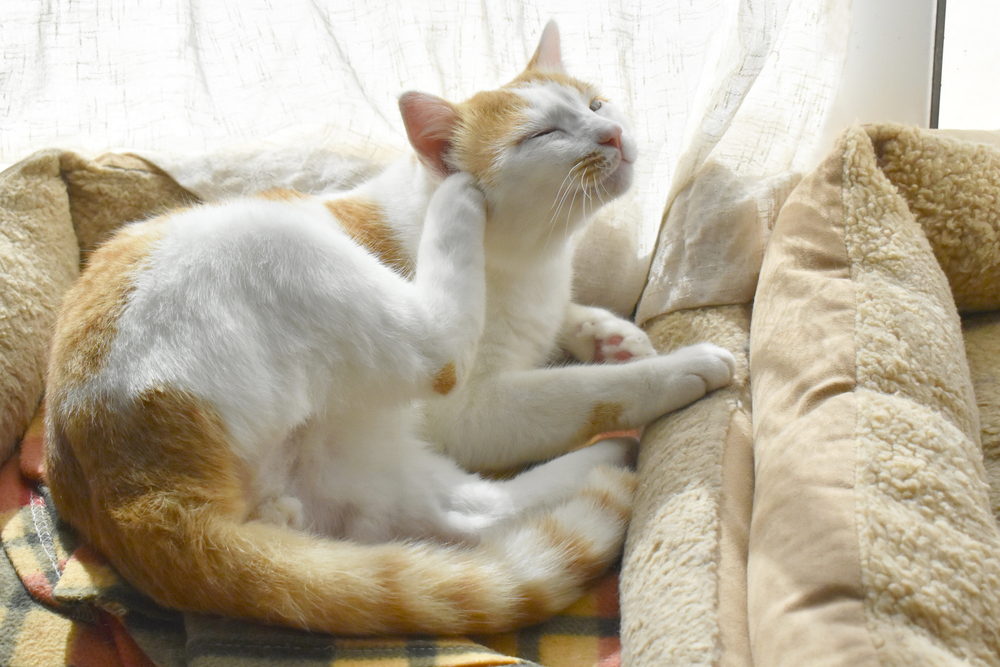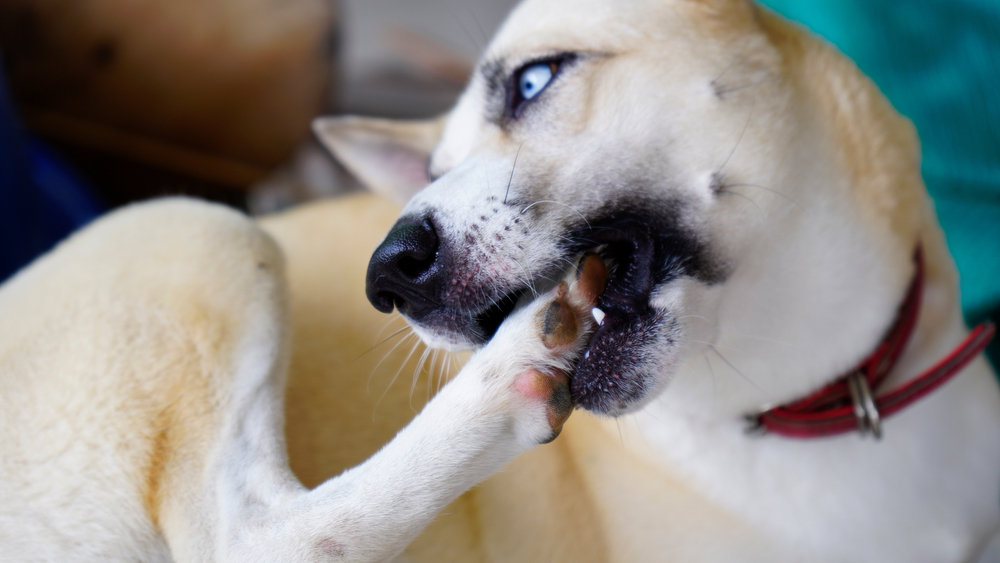Nothing sounds louder than your pet’s incessant scratching, chewing, and licking. But, you’re not the only one losing sleep—itchy pets are miserable. Persistent irritation and itchiness can increase pet stress and anxiety, and lead to secondary problems such as infections and self-trauma.
Effective relief requires getting to the root of your pet’s itchiness. Fortunately, this is as easy as a visit to Pioneer Animal Hospital. Here are seven common causes for itchiness in pets.
#1: Your pet is suffering from allergies
Spring is in full bloom here in Kansas, and so are common allergens. While humans with allergies experience respiratory signs, allergies in pets are primarily expressed through the skin. After exposure by inhalation or direct contact, allergic pets experience intense itching (i.e., atopic dermatitis [atopy]). This discomfort may be localized to one area, such as the paws, or generalized over the entire body, including the paws, groin, flank, and axillary (i.e., armpit) regions. Left untreated, atopy can lead to secondary bacterial or yeast infections and painful self-trauma from persistent chewing and scratching.
Pets can react to seasonal allergens, such as grasses and tree pollens, as well as year-round irritants, including mold, dust, and mildew. Fortunately, if your pet’s itchiness is allergic in nature, your Pioneer Animal Hospital veterinarian can provide fast and effective relief.
#2: Your pet is experiencing a food allergy
True food allergies, which should not be confused with food intolerance or sensitivity, are relatively uncommon in pets. Food allergies occur when your pet’s immune system has an adverse reaction to an ingredient in their food and develops antibodies against the perceived threat. This hypersensitivity causes inflamed and itchy skin along with digestive signs, such as vomiting and diarrhea, or loose stool, gas, and nausea.
Unlike seasonal allergies, food allergies persist throughout the year. If our veterinarian suspects a food allergy, they will recommend a feeding trial for your pet to confirm the diagnosis and determine which ingredient triggers their immune response.
#3: Your pet has fleas
Fleas are tiny, thin, flat, wingless parasites that can jump an astounding seven inches vertically and 13 inches horizontally. But, before you give them too much credit, you should know that these disease-carrying parasites survive by biting and feeding on your pet and often causing itching and discomfort. For some pets, a single flea bite can trigger a severe hypersensitivity reaction known as flea allergy dermatitis (FAD).
Fleas are typically too fast to be seen with the naked eye, so you should look for flea dirt (i.e., digested blood), which resembles black pepper flakes, on your pet’s skin, especially near the tail base. If fleas are causing your pet’s discomfort, our veterinarians will recommend consistent monthly flea prevention for at least 90 days to break the flea life cycle.
#5: Your pet has a skin infection

Bacterial and fungal (i.e., yeast) infections can occur secondary to allergies, poor grooming, parasites, self-trauma (i.e., aggressive biting and scratching), and hormone imbalances. Yeast is a normal part of your pet’s skin flora, but when your pet’s immune system is impaired, the normal population multiplies and causes inflammation and intense itching.
Pets with skin infections may have a musty or corn chip odor, dry, scaly, thickened, or inflamed skin, and visible lesions, bumps, or sores. Affected pets may also experience ear infections.
If your veterinarian suspects a skin infection, they likely will treat your pet with a combination of oral and topical antibiotics or antifungal medication.
#6: Your pet is unclean
Excessive oils in your pet’s coat, along with accumulated debris, can increase matting and block air from reaching the skin. Although cats and some dog breeds are fastidious groomers, certain health conditions can affect their self-grooming behavior and result in an unkempt appearance and itchy discomfort.
If your pet is not grooming, but skin irritation and parasites are not visible, a thorough bath and grooming may be the answer to their itchiness. But, if your pet has inexplicably stopped self-grooming, they need a veterinary examination at Pioneer Animal Hospital.
#7: Your pet is anxious
Scratching, chewing, flank sucking, and licking are compulsive habits in pets similar to fingernail chewing and hair pulling or twisting in people. These repetitive behaviors may result from boredom, or be a stress-relieving or coping strategy. Licking and flank sucking may begin as a self-soothing behavior, but progress into painful skin issues such as hot spots (i.e., acute moist dermatitis) or lick granulomas.
Immediate resolution for your pet’s behavior-based grooming disorder involves treating any pain or inflammation and considering anti-anxiety medication. Long-term management generally involves identifying and removing stressors and providing consistent physical and mental exercise and enrichment.
Itchy pets are miserable pets—until their devoted owners bring them to Pioneer Animal Hospital. Our American Animal Hospital Association (AAHA)-accredited veterinary team will perform a complete nose-to-tail assessment to expose the truth behind the itch and provide your four-legged friend with fast, effective relief. Contact us and schedule your pet’s appointment.

